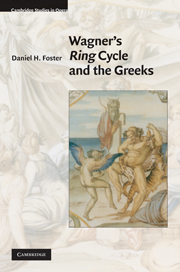Book contents
- Frontmatter
- Contents
- List of musical examples
- Preface
- Acknowledgments
- Introduction
- Part I Epic
- Part II Lyric
- 5 Introduction: what is lyric?
- 6 Orpheus and lyric liberation
- 7 First-person opera and lyric identity
- 8 Lyric and the rebirth of tragedy
- Part III Drama
- Epilogue: Time, the Ring, and Performance Studies
- Appendices: Wagner's primary and secondary sources
- Notes
- Bibliography
- Index
8 - Lyric and the rebirth of tragedy
from Part II - Lyric
Published online by Cambridge University Press: 07 May 2010
- Frontmatter
- Contents
- List of musical examples
- Preface
- Acknowledgments
- Introduction
- Part I Epic
- Part II Lyric
- 5 Introduction: what is lyric?
- 6 Orpheus and lyric liberation
- 7 First-person opera and lyric identity
- 8 Lyric and the rebirth of tragedy
- Part III Drama
- Epilogue: Time, the Ring, and Performance Studies
- Appendices: Wagner's primary and secondary sources
- Notes
- Bibliography
- Index
Summary
It is through Wagner's dual perspective on the past and the future that we recognize how his utopian philosophy was firmly rooted, as Mann reminds us, in the mythological. This kind of progressive backward glance is the essence of Wagner's political aestheticization of the Greeks. To requote Deathridge: the Greeks were, for Wagner, “the pristine source of a lost culture – an ideal of fundamental origins projected onto the utopian future of a society encumbered by alienated living and a lack of spiritual freedom.” But in Siegfried and in his discussions of lyric in general and Greek lyric in particular, Wagner is more interested in a utopian future than a mythological past. He tends to regard lyric as a stop along the way to poetry's highest evolutionary goal, drama, particularly drama in the form of tragedy. His description of lyric and drama in “The Art-Work of the Future” is emblematic of this visionary perspective. Lyric is seen as “primal,” while drama is lyric's “later, more conscious, loftiest completion.” This forward-looking tendency is further strengthened by the historical fact that Wagner wrote the libretto for his lyric opera, Siegfried (originally Der junge Siegfried), after he wrote Götterdämmerung (originally Siegfrieds Tod). In writing Siegfried, therefore, Wagner already knew the dramatic finish to his lyric hero's life and so, to some extent, his vision of Siegfried's future dramatic actions determine Wagner's representation of Siegfried's lyrical past.
- Type
- Chapter
- Information
- Wagner's Ring Cycle and the Greeks , pp. 157 - 180Publisher: Cambridge University PressPrint publication year: 2010



